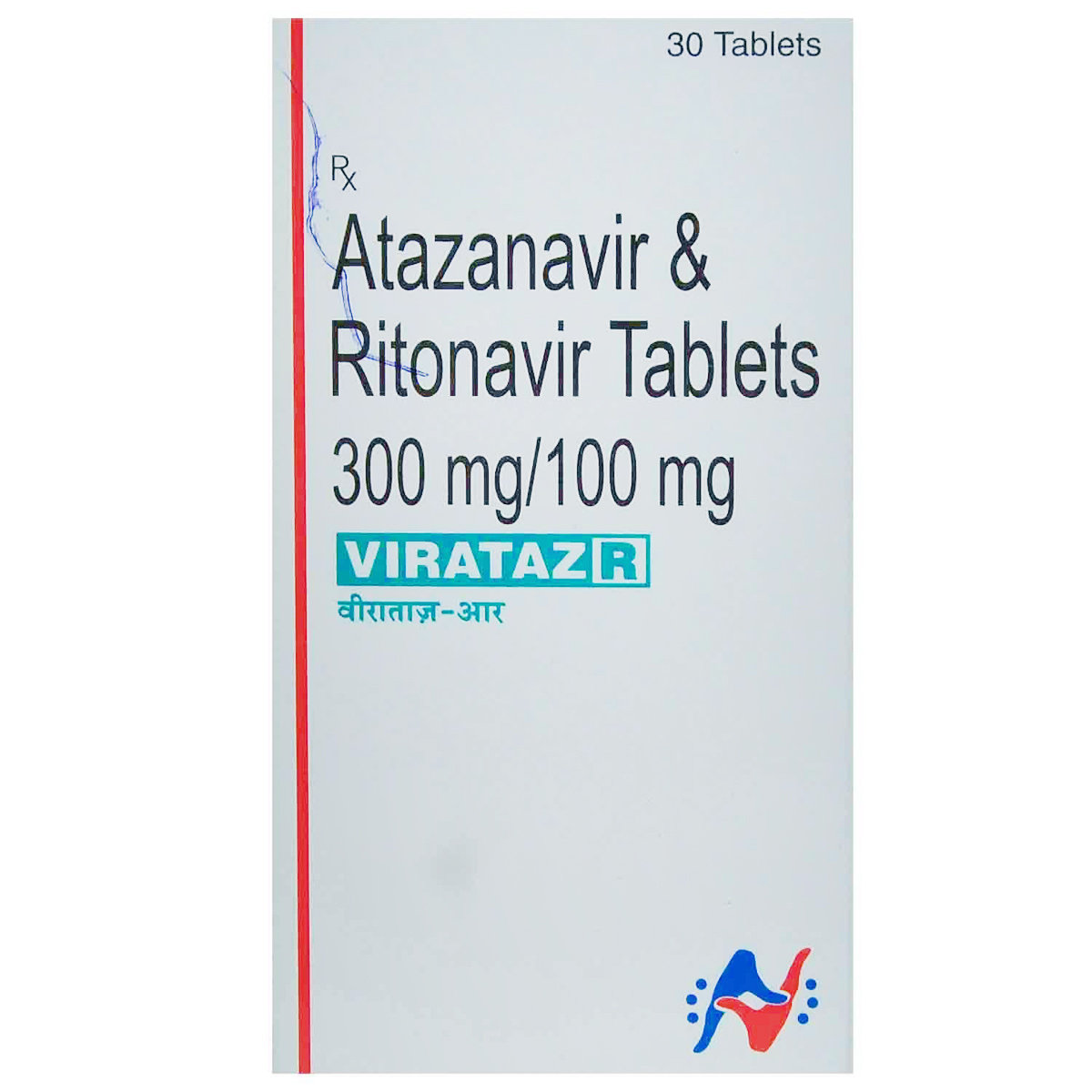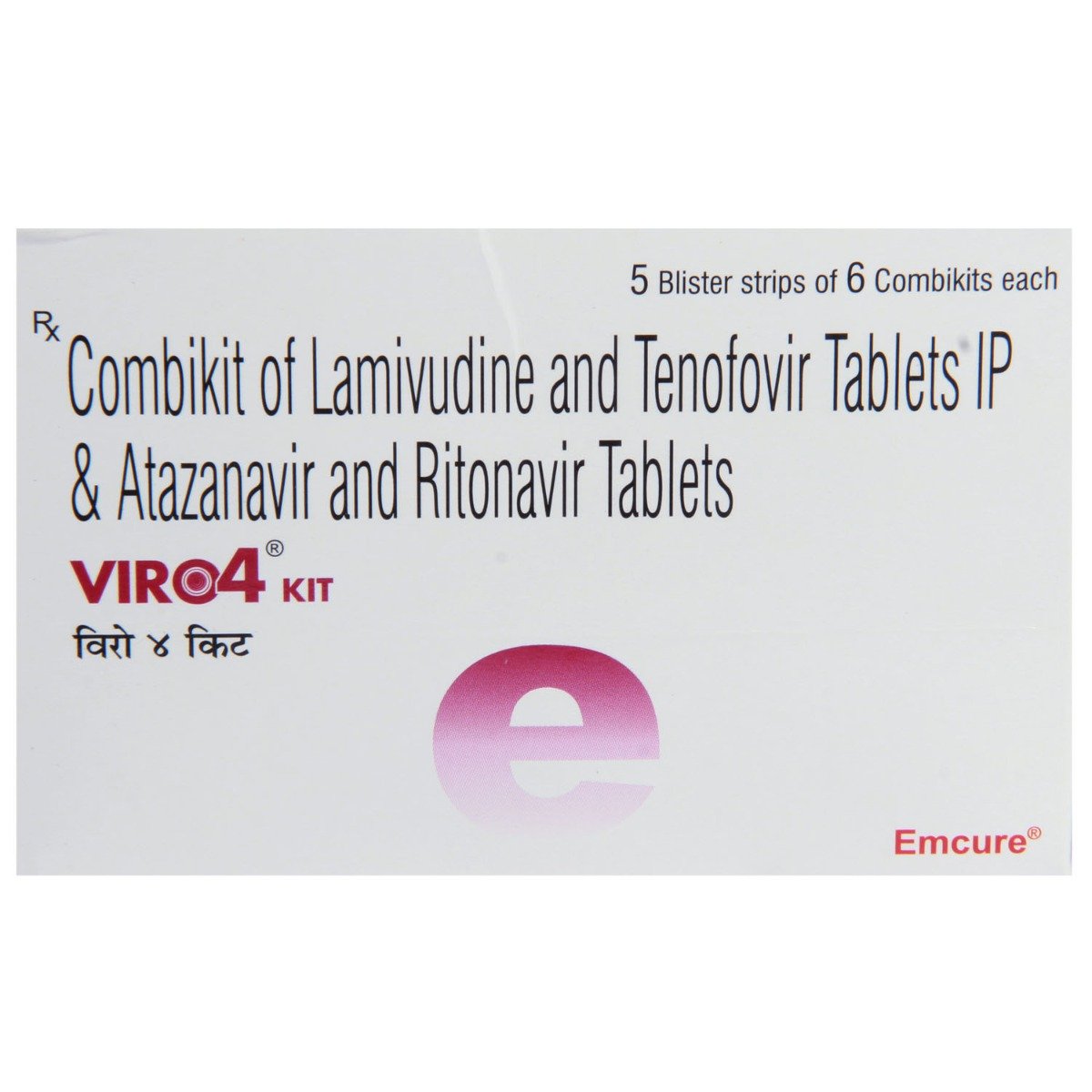Atazanavir+ritonavir
About Atazanavir+ritonavir
Atazanavir+ritonavir belongs to the class of medications called ‘antiretroviral agents’ used to treat HIV infection. HIV is a virus that attacks the immune cells of the body leading to decreased immunity. It spreads through body fluids such as semen, vaginal fluid, and blood. Symptoms include fever, chills, rash, night sweats, muscle aches, tiredness, and sore throat that usually last for days to several weeks.
Atazanavir+ritonavir is a combination of Atazanavir and Ritonavir. These drugs belong to the class of protease inhibitors. They work by inhibiting the protease enzyme production, which is required by the HIV-infected cells to make new viruses. This effect helps to inhibit viral replication.
Take Atazanavir+ritonavir exactly as prescribed by the doctor. Atazanavir+ritonavir may cause side effects such as stomach ache, diarrhoea, feeling sick (nausea), vomiting (being sick), flushing (reddening of the skin), headache, dizziness, pain in the throat, cough, upset stomach, a tingling sensation or numbness in the hands, feet or around the lips and mouth, bad taste in the mouth, damage to the nerves that can cause weakness and pain, itching, rash, joint pain and back pain, dyspepsia (indigestion), and fatigue (tiredness). Inform your doctor if any of these side effects persist or get worse.
It is not recommended to take Atazanavir+ritonavir if you are allergic to any contents of it. Before taking Atazanavir+ritonavir, inform your doctor if you have any liver disease, hepatitis B or C (liver infections), hemophilia (bleeding disorder), erectile dysfunction, diabetes, gall stones, and kidney disease. Inform your doctor if you are pregnant or breastfeeding. Consult your doctor before using this medicine for children. Atazanavir+ritonavir should be used with caution in elderly patients. Alcohol consumption may increase the risk of side effects. Atazanavir+ritonavir may cause dizziness, so do not drive or operate heavy machinery if you feel dizzy.
Uses of Atazanavir+ritonavir
Medicinal Benefits
Atazanavir+ritonavir belongs to the group of medicines called antiretroviral therapy (ART). Atazanavir+ritonavir is a fixed-dose combination (FDC) and contains atazanavir and ritonavir. FDC helps decrease drug resistance (reduction in medication effectiveness) as HIV can easily develop drug resistance. Atazanavir+ritonavir helps reduce the symptoms, control the infection, and prevent opportunistic infections effectively. It further helps in improving the quality of life of a patient with HIV.
Directions for Use
Storage
Side Effects of Atazanavir+ritonavir
- Stomach ache
- Diarrhoea
- Feeling sick (nausea)
- Vomiting (being sick)
- Flushing (reddening of the skin)
- Headache
- Dizziness
- Pain in the throat
- Cough
- Upset stomach
- A tingling sensation or numbness in the hands, feet or around the lips and mouth
- Bad taste in the mouth
- Damage to the nerves that can cause weakness and pain
- Itching
- Rash
- Joint pain and back pain
- Dyspepsia (indigestion)
- Fatigue (tiredness)
Drug Warnings
Inform your doctor if you develop persistent diarrhoea or vomiting, as it may affect the effectiveness of Atazanavir+ritonavir. Atazanavir+ritonavir may cause pancreatitis, so inform your doctor if you develop symptoms such as nausea (feeling sick), vomiting, or stomach pain. Atazanavir+ritonavir may lead to opportunistic infections (infections that occur frequently or severely in patients with weak immune systems), so inform your doctor immediately if you experience symptoms of infection such as muscle weakness, weakness beginning in the hands and feet that progress towards the trunk, palpitations (pounding heartbeat), and tremors. Atazanavir+ritonavir may destroy bone leading to symptoms such as joint stiffness or pain. It may also cause muscle pain, tenderness, or weakness. Atazanavir+ritonavir may also cause dizziness and abnormal heartbeat. Inform your doctor immediately if you notice any significant changes in the electrocardiogram (ECG).
Drug Interactions
Drug-Drug Interactions: You should not take Atazanavir+ritonavir with the following medications: anti-allergy medicines (astemizole and terfenadine), medicines used to correct heartbeats (amiodarone, bepridil, dronedarone, flecainide, propafenone, and quinidine), medicines used to treat migraine (dihydroergotamine and ergotamine), medicine used to stop excessive bleeding after childbirth or abortion (ergonovine and methylergonovine), medicines used to relieve anxiety (diazepam, estazolam, flurazepam, triazolam, and midazolam), antipsychotic drugs (clozapine, pimozide, and quetiapine), antidepressants (lurasidone and Hypericum perforatum), medicine used to treat chest pain (ranolazine), medicine used to treat pain (pethidine, piroxicam, buprenorphine, and propoxyphene), medicine used to treat stomach problems (cisapride), antiinfective (rifabutin), antifungal (voriconazole), medicines used to treat high cholesterol (atorvastatin, lomitapide, and rosuvastatin), anticancer agents (neratinib and irinotecan), medicine used to treat enlarged prostate (alfuzosin), antibacterial (fusidic acid), medicines used to treat erectile dysfunction (sildenafil, avanafil, vardenafil, and tadalafil), medicine used to treat gout (colchicine), antiasthma (salmeterol), anticoagulant (warfarin), medicines used to lower blood pressure or correct heart rhythm (amiodarone, diltiazem, systemic lidocaine, and verapamil), medicine used to treat heart disease (digoxin), oral contraceptives (ethinyl estradiol), and medicines that suppress immune system (cyclosporin, tacrolimus, and sirolimus).
Drug-Food Interactions: No interactions found.
Drug-Disease Interactions: Atazanavir+ritonavir should not be used in patients with liver disease, hepatitis B or C (liver infections), hemophilia (bleeding disorder), erectile dysfunction, diabetes, gall stones, and kidney disease.
Drug-Drug Interactions Checker List:
Safety Advice

Alcohol
cautionConsumption of alcohol may increase the risk of side-effects.

Pregnancy
cautionAtazanavir+ritonavir should be used with caution in pregnant women. It is given only if clinically needed and when benefits outweigh the risk.

Breast Feeding
cautionIf Atazanavir+ritonavir is prescribed during breastfeeding, the doctor may advise you to stop breastfeeding as this medicine can pass into breastmilk.

Driving
cautionAtazanavir+ritonavir may cause dizziness, so do not drive or operate heavy machinery if you feel dizzy.

Liver
cautionAtazanavir+ritonavir should be used with caution in patients with liver diseases. The dose may have to be adjusted by your doctor.

Kidney
cautionAtazanavir+ritonavir should be used with caution in patients with kidney diseases. The dose may have to be adjusted by your doctor.

Children
cautionThis medicine is not recommended for children below 3 months. However, please consult your doctor for more information.
Habit Forming
Diet & Lifestyle Advise
- Eat a healthy and balanced diet. Eat vitamin and nutrient-rich food such as dark-green, yellow, orange, and red vegetables and fruit as it helps to boost your immune system. Option for lean protein and whole grains.
- Avoid eating raw meat and eggs. Consume properly boiled and cooked meat, poultry, or seafood.
- Eat bland and low-fat foods and avoid spicy or oily foods if you experience nausea or vomiting.
- Try to reduce emotional and physical stress by spending time with family or whatever makes you happy.
- Drink more fluids and avoid alcoholic beverages to prevent dehydration.
- Wash your hands properly before and after eating.
- Make sure you sleep at least 8 hours a day.
Special Advise
- Atazanavir+ritonavir may still develop infections or other illnesses associated with HIV infection or AIDS. So, people taking Atazanavir+ritonavir should be carefully monitored throughout the treatment.
- You can still infect other people while taking Atazanavir+ritonavir. So, use necessary precautions to avoid infecting others.
- Atazanavir+ritonavir may cause abnormal liver function tests. So, regular monitoring of liver function is necessary while taking this medicine.
Patients Concern
Disease/Condition Glossary
HIV infection: HIV (human immunodeficiency virus) is a virus that attacks the immune system, making the individual susceptible to other infections or illnesses. People with HIV experience flu-like symptoms such as fever, chills, rash, night sweats, muscle aches, tiredness, and sore throat. These symptoms usually last for days to several weeks. It spreads through body fluids such as semen, vaginal fluid, and blood. If left untreated, this condition can lead to AIDS (Acquired Immunodeficiency Syndrome). It is a life-long condition, and there is no definite cure for it. However, it can be controlled by treating with antiretroviral agents.
FAQs
Atazanavir+ritonavir is a combination of two medicines: Atazanavir and Ritonavir. These two drugs work by inhibiting the protease enzyme production, which is required by the HIV-infected cells to make new viruses. Thereby preventing viral replication and controlling the infection.
Atazanavir+ritonavir should be taken with food (after a meal or substantial snack) as this helps in effective absorption of the medicine.
Atazanavir+ritonavir may cause side-effects such as stomach ache, diarrhoea, feeling sick (nausea), vomiting (being sick), flushing (reddening of the skin), headache, dizziness, pain in the throat, cough, upset stomach, a tingling sensation or numbness in the hands, feet or around the lips and mouth, bad taste in the mouth, damage to the nerves that can cause weakness and pain, itching, rash, joint pain and back pain, dyspepsia (indigestion), and fatigue (tiredness). Inform your doctor if any of these side-effects persist or get worse.
Atazanavir+ritonavir should not be used in patients with liver disease, hepatitis B or C (liver infections), haemophilia (bleeding disorder), erectile dysfunction, diabetes, gall stones, and kidney disease as it may worsen these conditions.
Atazanavir+ritonavir doesn’t cure HIV infection. However, it helps to control the disease and prevent opportunistic infections.








